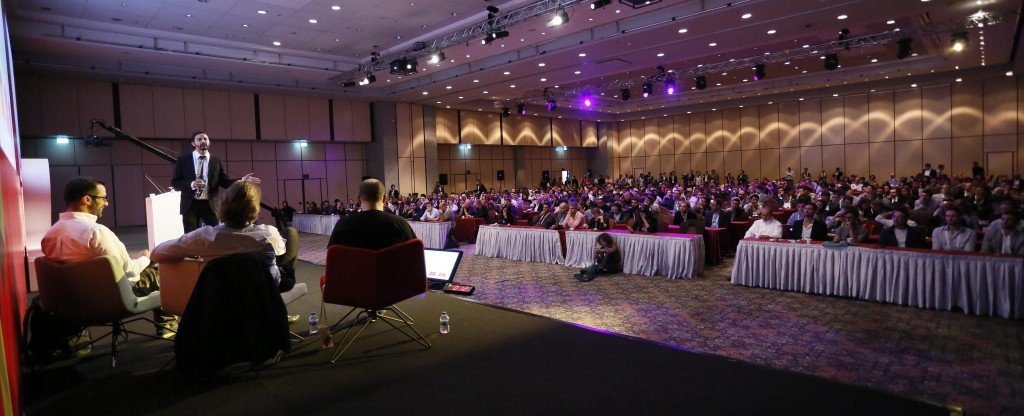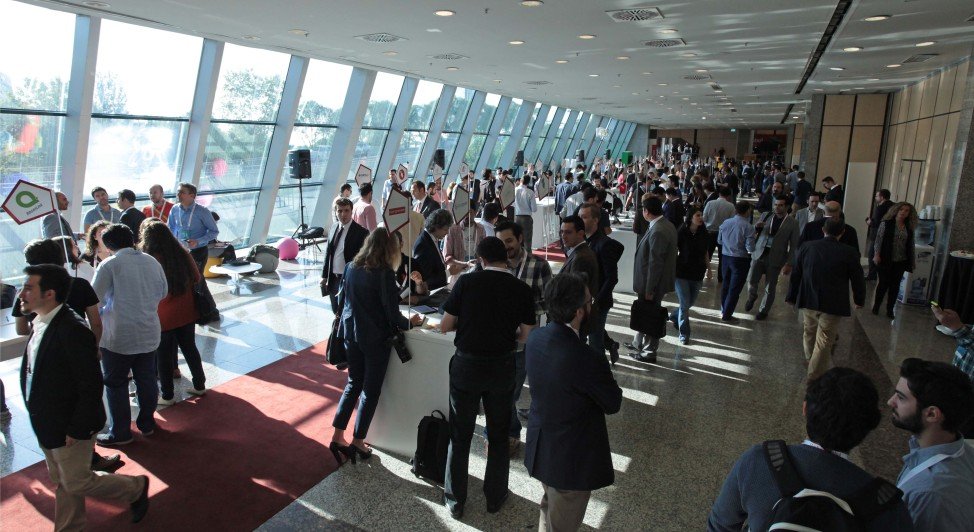Standing at a dilapidated sidewalk corner in Istanbul one evening, looking towards the vastness of Taksim Square and the perimeter of Gezi Park, it was hard to believe how subdued the area was compared to images of unrest that flooded the international press about a year and a half ago.
Instead of thousands of fervent demonstrators and heavy-handed police swarmed together, there were energetic simit vendors and tame gaggles of tourists (and pigeons) spotting the square.
(Disclosure: tech.eu was part of a group of journalists invited to go to Turkey to attend the Startup Istanbul event as well as the Webit Congress.)
Despite the drastic change in scene in that small area of Istanbul, Turkey has faced a tumultuous year, particularly in the realm of Web access.
For example: earlier this year, the country saw Twitter and YouTube temporarily blocked by the government in efforts to tighten control over online speech.

What’s more, Turkish president Recep Tayyip Erdoğan recently met with the Committee to Protect Journalists (CPJ) alongside Ankara’s International Press Institute (IPI) and, during the conference, remarked: “I am increasingly against the Internet every day.”
Erdoğan also signed a law passed by the parliament in September that expanded the telecom authority’s powers to block websites without prior court orders. Part of the law has since been annulled by Turkey’s Constitutional Court.
Despite geopolitical tensions, Turkish entrepreneurs remain optimistic
“Turkey is a unique country that has been transforming incredibly quickly, especially in the last two decades. We have a very large young population and the youth is well-educated,” said Fevzi Gungor, CEO of Ode.al, a fledgling Istanbul-based startup that launched its mobile payments app for small merchants in August of this year.
With half of Turkey’s 76 million-large population under 30 years of age, a growing economy (albeit slower than expected) and Internet subscriptions up 500% since 2008, it seems the country has what it takes to become a rising star in the digital ecosystem.
Gungor added that one of the advantages of Turkey as a tech innovation hub is that it’s a convenient access point for the EMEA region – culturally and commercially.
Last week, Ode.al was selected as a finalist at Startup Istanbul – an annual event bringing together startups and investors from across Europe, Asia and the US – where Gungor had the opportunity to pitch in front of an esteemed panel of judges including 500 Startup’s Dave McClure, Qualcomm Ventures’ Jason Ball and Microsoft Ventures’ Rahul Sood.
Fifteen entrepreneurs presented with many looking visibly uncomfortable when the timer was up and the judges each had their share of grilling the entrepreneurs on business models, finances and customer acquisition strategies. Gungor was one of the few to walk off the stage relatively unscathed.

Erdem Gelal, co-founder of Istanbul-based music discovery platform Cubic.fm, appeared at Startup Istanbul’s startup expo on one day and then pitched at the Webit Congress on the next.
When asked about the current state of the Turkish entrepreneurial landscape, Gelal told tech.eu: “Personally, I would divide the startup scene into two... First, there are the more mature startups that were established a couple of years back, such as Markafoni and Trendyol, which are more e-commerce or marketplace startups. Then, there’s the more product-focused, consumer-based or valued-added SaaS startups that the ecosystem is seeing more of lately.”
Many of the earlier wave of e-commerce startups attracted quite a bit of foreign attention. For instance, in 2011, fashion website Trendyol closed a sizeable $26 million funding round from notable Silicon Valley VC Kleiner Perkins.
More recently, South African media company Naspers bought the remaining shares of Turkish e-commerce giant Markafoni and UK-based mobile payments company Monitise acquired Istanbul-based mobile commerce tech provider Pozitron for $100 million.
But Gelal explained that the Turkish market is still viewed mostly by investors as a lot riskier than Western markets and because of that, when investors fund a company, they typically expect a short-term, rather than a long-term, return.
“They tend to invest in startups that eliminate that risk and really show growth potential in the short-term future,” he added. “We’re a company that focuses on consumers and will become more valuable as we grow, scale and optimize the experience – so it’s likely a long-term return – which is why it was harder for us to raise a first round. But we did, and we’re growing.”
Funding challenges and outlook
Time and time again, lack of access to capital was named, by entrepreneurs and investors alike during my time in Istanbul, as one of the key weaknesses of the current Turkish startup ecosystem.
“We lack liquidity to back entrepreneurs in the early-stage. Because we operate in an emerging country, the majority of local funds still go to infrastructure, renovation and improvement projects,” said Ode.al’s Gungor. “There are just a few Turkish VCs and business angels focusing on early-stage startups... and that’s not sufficient. We would definitely like to see European VCs more active in the region. If 30 more local VCs would appear on the scene it would improve Turkey's global stance drastically.”
Among the rows of stands at the Webit Congress’ Startup Village Expo was Murat Deligöz, CEO of mobile ad platform Angelfish. Though the startup landed $500,000 of funding last year, Deligöz said it definitely wasn’t easy.
“The reason we got an investment is because I have about 18 years of experience in the Internet/media business. For startups to get an investment in Turkey, you have to build a product first, get a customer base. Only then, will investors might look at you from another point of view. It’s very difficult and the ecosystem is very limited because the money that’s poured in here is limited,” he explained with a hint of resentment in his voice.
Nevertheless, Turkey – along with its crop of burgeoning startups – is increasingly garnering interest from the global venture capital community.
In January, international VC firm Earlybird raised $110 million for its Digital East Fund, which concentrates on the “underserved and attractive” Turkey and CEE region. A couple of days later, Startupbootcamp – a pan-European network of startup accelerators – launched in Istanbul.
During a panel titled "Local Opportunities for Investors" at Startup Istanbul, Andy Tsao – a managing director at US-based high-tech commercial bank Silicon Valley Bank, which operates in China, India, the UK and Israel – spoke about why Turkey is showing up on the organization's radar:
"When we are looking at some of these markets, we’re looking at high-growth economies as well as relatively large markets, and Turkey is really sort of coming into its own... As a bank, we're a much more regulated entity so entering a market like Turkey would be a very big commitment. We’re not there yet, we’re still more in the discovery stage and really trying to meet entrepreneurs and VC firms."

Despite buzzing VC activity, recent geopolitical turmoil and more stringent Internet regulations in the region could lead investor interest to cool off.
Looking ahead
Also participating on the investor panel at Startup Istanbul was Christopher Rogers, a General Partner at Lumia Capital, a Silicon Valley-based VC firm that invests half of its assets in the US while the other half is allocated among three emerging markets.
"We’ve been much more active in Latin America and the Middle East, and now we’re trying to find investments here in Turkey... We’ve been here a number of times, know a number of the ecosystem's players, but as a growth-stage investor, we have not yet found a company that has all the characteristics we like in a company and has some of those characteristics that will translate to a typical VC investment which lead to an eventual exit," explained Rogers.
"That is, as we’ve heard many times today, it’s a situation where the the full ecosystem is not completely developed and that has kept us actively looking but not yet acting."
Although many of the Turkish entrepreneurs I spoke to expressed concerns about the country's relatively weak entrepreneurial infrastructure, there was vigor in their voices when speaking about the future and taking the ecosystem to the next level.
"There are two things that evolve the ecosystem: The first is access to capital and the second is good mentorship... And both factors, I think, are improving the ecosystem in Turkey," said Cubic.fm's co-founder Gelal on the future of startups in Turkey.
"Compared to previous years, we now have better access to funding. Even in these kinds of conferences we see more and more global investors listening and paying attention – this wasn’t the case maybe a couple of years back," he added cheerfully.
Featured image credit: Laszlo Ilyes / Flickr Taksim Square: emei / Shutterstock.com Startup Istanbul photos: courtesy of Startup Istanbul


